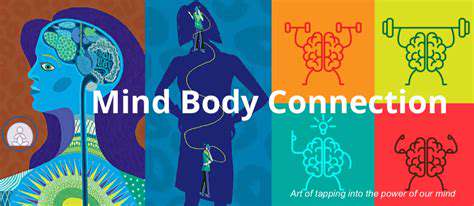Coping with Physical Anxiety: Signs and Solutions
Understanding the Connection Between Mind and Body

Understanding the Foundation of the Connection
The mind-body connection operates through complex biochemical pathways. Stress hormones like cortisol trigger physical changes, while physical sensations feed back into emotional states. This bidirectional communication forms the basis of psychosomatic medicine. Recognizing these mechanisms helps demystify why emotional distress causes physical symptoms.
Exploring the Historical Context
Ancient healing traditions always acknowledged mind-body links—Ayurveda and Traditional Chinese Medicine treated emotional and physical health as inseparable. Western medicine only recently rediscovered these connections through psychoneuroimmunology research. This historical perspective reminds us that we're relearning, not discovering, these fundamental truths.
Analyzing the Key Components
Three primary systems mediate mind-body interactions: the nervous system (particularly the autonomic branch), the endocrine system (hormone regulation), and the immune system. When one system becomes dysregulated, the others follow suit, creating cascading effects throughout the body.
Examining the Interdependencies
These systems don't operate in isolation—they form an integrated network. Chronic stress weakens immune function, which alters neurotransmitter production, affecting mood regulation. This explains why anxious people often experience frequent illnesses and depressive symptoms simultaneously.
Evaluating the Impact of External Factors
Modern life introduces unprecedented stressors—digital overload, sleep disruption, processed foods—that strain our ancient stress-response systems. Environmental toxins and social isolation further disrupt delicate biochemical balances. Recognizing these factors helps explain rising anxiety rates in developed societies.
Modeling the Connection for Prediction
Advanced research now maps how specific thought patterns produce measurable physical changes. Neuroimaging shows how mindfulness practice literally rewires stress-response circuits. These models help predict which interventions will most effectively break anxiety cycles for different individuals.
Considering the Ethical Implications
As we understand these mechanisms better, we must avoid blaming people for their physical symptoms. It's all in your head becomes dangerous when we recognize that mental states directly affect physiology. Ethical care requires validating patients' experiences while offering science-based solutions.
Mindfulness Meditation trains attention to anchor in the present reality. This ancient practice cultivates nonjudgmental awareness of thoughts and bodily sensations. By observing rather than reacting to internal experiences, practitioners develop emotional resilience. Regular practice measurably reduces amygdala reactivity (the brain's fear center) while strengthening prefrontal regulation. These neurological changes explain mindfulness' proven benefits for anxiety management.
Seeking Professional Support and Resources
Understanding the Need for Professional Help
When anxiety symptoms persist despite self-help efforts, professional intervention becomes crucial. Therapists provide evidence-based techniques like cognitive behavioral therapy that target both mental patterns and physical symptoms. Medication management may help recalibrate neurochemistry in some cases. Professional support offers something self-help can't—an objective perspective to identify blind spots in your coping strategies.
Seeking help represents wisdom, not failure. Just as you'd consult a physical therapist for chronic back pain, mental health professionals address persistent anxiety with specialized tools.
Accessing Valuable Resources and Support Systems
Beyond individual therapy, numerous resources exist. Anxiety support groups provide communal healing—hearing others describe identical symptoms reduces shame and isolation. Many hospitals offer stress-reduction programs teaching biofeedback and relaxation techniques.
Quality online platforms (like ADAA or NAMI) offer reputable information and therapist directories. Local universities often provide low-cost counseling clinics staffed by supervised trainees. Libraries frequently host anxiety management workshops.
When exploring resources, prioritize evidence-based approaches over anecdotal advice. Look for programs grounded in cognitive-behavioral, mindfulness-based, or somatic experiencing modalities rather than vague stress relief promises.
Remember that finding the right help might require trying different approaches. What works for one person's anxiety might not suit another's. Persistence in seeking appropriate care makes all the difference in long-term recovery.